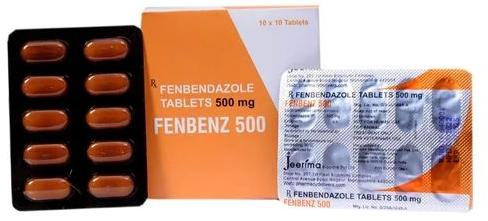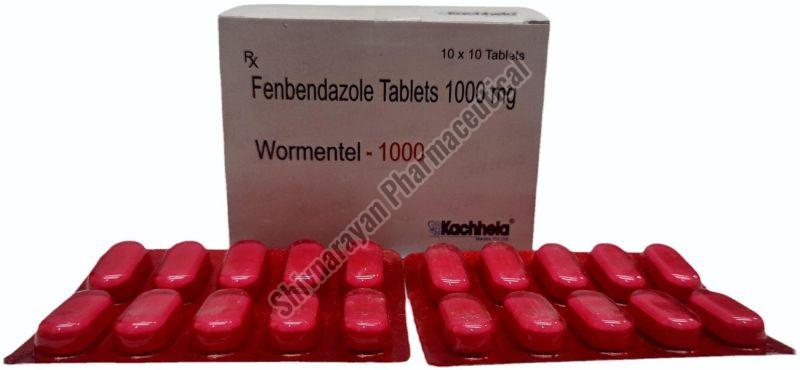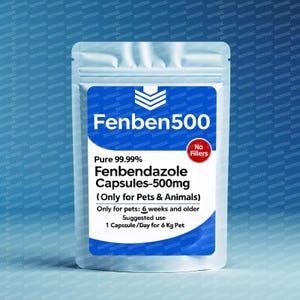fenbendazole capsules: FAQs Answered
Wiki Article
Discovering the Systems Behind Fenbendazole and Its Effect On Animal Health And Wellness
Fenbendazole is a commonly used anthelmintic understood for its effectiveness against numerous parasites. Its key mechanism includes the inhibition of microtubule formation, which interrupts crucial processes in these virus. Beyond its antiparasitic buildings, fenbendazole also appears to enhance immune reactions and possesses anti-inflammatory advantages. Understanding these diverse impacts might expose brand-new applications for pet wellness. Questions remain regarding its full potential and safety profile.The Pharmacokinetics of Fenbendazole
The pharmacokinetics of fenbendazole, a widely used anthelmintic in vet medication, involves the study of its absorption, circulation, metabolic rate, and discharging within pet systems. After administration, fenbendazole is rapidly absorbed from the stomach system, with peak plasma focus taking place within hours. Its circulation is affected by aspects such as cells binding and lipid solubility, allowing it to penetrate various tissues efficiently. The medication undertakes substantial metabolic rate largely in the liver, where it is exchanged energetic and inactive metabolites. These metabolites contribute in the medication's general effectiveness and security profile. Excretion occurs primarily via feces, with a smaller sized percentage removed using pee. The half-life of fenbendazole differs among varieties, which affects dosing routines. Understanding these pharmacokinetic buildings is crucial for maximizing its restorative usage and making certain efficient bloodsucker control in vet methods.Mechanisms of Action Against Parasites
Fenbendazole exerts its antiparasitic results mainly via the restraint of microtubule development in bloodsuckers. This interruption affects their architectural stability and cellular functions, leading to damaged basal metabolism. Consequently, the medication effectively compromises the survival and recreation of different parasitic microorganisms.Inhibition of Microtubule Development
Inhibition of microtubule formation stands for a vital device through which specific anthelmintic agents, consisting of fenbendazole, exert their impacts on parasites. Fenbendazole binds to tubulin, a healthy protein that forms microtubules, disrupting the polymerization process necessary for microtubule setting up. This disturbance hinders essential mobile features, including mitosis, intracellular transportation, and structural honesty. As microtubules play a vital role in preserving the form and function of parasitical cells, their inhibition brings about cell cycle apprehension and ultimate death of the parasite. This device is specifically efficient versus nematodes, as their dependence on microtubules for wheelchair and nutrient absorption makes them vulnerable to fenbendazole. The inhibition of microtubule formation is a critical facet of fenbendazole's healing efficacy in veterinary medicine.Disruption of Basal Metabolism
Interrupting energy metabolic rate is another essential mechanism through which fenbendazole targets parasitic microorganisms. This anthelmintic modifies the energy production pathways within parasites, primarily affecting their capability to produce adenosine triphosphate (ATP) By preventing glucose uptake and disrupting mitochondrial feature, fenbendazole restrictions the power sources necessary for the survival and recreation of these organisms. As a result, bloodsuckers end up being significantly at risk to ecological stress and anxieties and immune responses. The disturbance in energy metabolism not just impacts the bloodsuckers directly but likewise decreases their ability to absorb nutrients, further harming their growth - 222 mg. In general, the interruption of energy metabolic process represents a basic aspect of fenbendazole's efficiency versus different parasitic infections, adding substantially to enhanced animal wellness resultsPotential Side Results and Safety Account
The prospective adverse effects and safety and security profile of fenbendazole warrant mindful consideration, especially in vet applications. While typically regarded as risk-free, some animals might experience unfavorable reactions, including gastrointestinal disruptions such as vomiting and looseness of the bowels. Additionally, neurological signs, although unusual, have been reported in sensitive individuals, highlighting the requirement for surveillance during treatment.
Fenbendazole's security in different varieties, consisting of dogs and felines, has been recorded, but dose and period of treatment need to be thoroughly taken care of to minimize dangers. Expectant or breast feeding pets might additionally call for unique focus, as the effects on developing fetuses or nursing spawn are not fully comprehended.
Routine veterinary appointments can aid mitigate potential negative effects and ensure the medication is provided properly. Subsequently, while fenbendazole is a reliable anthelmintic agent, caution concerning its negative effects is necessary for preserving pet wellness.

Fenbendazole's Impact on Immune Function
Fenbendazole has been kept in mind for its prospective to modulate body immune system feedbacks in pets. Its anti-inflammatory residential properties may contribute to boosted immune function, providing a twin benefit in handling health and wellness (fenbendazole 222). Recognizing these results is important for examining fenbendazole's function in vet medicineImmune System Inflection

Anti-inflammatory Characteristics
Anti-inflammatory effects stand for a significant aspect of fenbendazole's influence on immune feature. Study indicates that fenbendazole may reduce the production of pro-inflammatory cytokines, which are critical in mediating inflammatory reactions. By modulating these cytokines, fenbendazole can potentially ease inflammation-related problems in pets. This anti-inflammatory activity not just aids in handling signs related to different diseases but additionally improves general immune system efficacy. In addition, its capacity to promote a well balanced immune feedback assists avoid excessive inflammatory damage, which can lead to chronic health problems. Consequently, fenbendazole's duty in inflammation monitoring underscores its importance in vet medication, offering a dual benefit of antiparasitic activity and body immune system support for pet health his explanation and wellness.Applications Past Standard Parasitic Infections
While primarily acknowledged for its effectiveness versus different parasitical infections, fenbendazole has garnered focus for potential applications past this conventional extent. Recent researches suggest that fenbendazole may have advantageous results on cellular wellness and immune reaction, making it an appealing prospect for handling various other health and wellness problems in animals. As an example, its reported anti-inflammatory homes may provide relief for pets struggling with persistent inflammatory diseases. In addition, some research suggests that fenbendazole can contribute in supporting the total health of pets by enhancing vitamins and mineral absorption and gastrointestinal health and wellness. Its possible as an adjunct therapy in cancer treatment has sparked rate of interest, as preliminary findings recommend it may hinder lump cell growth in specific contexts. These varied applications highlight fenbendazole's versatility, encouraging further exploration into its multifaceted benefits for animal health past its conventional use as see this a deworming agent.Future Study Instructions and Effects for Animal Health
The exploration of fenbendazole's potential applications has actually opened up brand-new methods for research study targeted at improving animal health. Future studies could concentrate on its performance versus a wider series of microorganisms, consisting of bacteria and infections, consequently broadening its role in veterinary medication. The ramifications of fenbendazole's mechanisms, such as its influence on immune inflection, warrant better examination to understand exactly how it can boost total wellness in different species.In addition, research study may explore optimal dosages and solutions to optimize effectiveness while minimizing possible side impacts. Examining fenbendazole's synergistic effects with other drugs might lead to a lot more effective therapy protocols. Longitudinal researches evaluating lasting outcomes in pets treated with fenbendazole could give important understandings into its safety and security and performance. In general, the ongoing exploration of see page fenbendazole uses promising capacity to boost animal health and wellness, demanding a collaborative approach among researchers, vets, and pharmaceutical developers to assist in advancements around.
Frequently Asked Concerns
Can Fenbendazole Be Made Use Of in Livestock for Parasite Avoidance?
The concern of whether fenbendazole can be made use of in livestock for parasite avoidance matters, as manufacturers seek efficient therapies (fenbendazole 444). Study indicates it may supply advantages, however correct guidelines and veterinary suggestions are essential for safe useWhat Is the Suggested Dose of Fenbendazole for Various Animals?

Exist Any Type Of Understood Medication Interactions With Fenbendazole?
Present knowledge indicates that fenbendazole may interact with particular medicines, possibly affecting their efficacy or metabolic rate. Veterinary specialists advise seeking advice from a veterinarian to examine specific pet situations and figure out any kind of feasible interactions before management.Exactly How Does Fenbendazole Compare to Other Antiparasitic Medications?
Fenbendazole is typically compared to various other antiparasitic medicines based on efficacy, range of activity, and safety accounts. It is preferred for its efficiency versus a large range of bloodsuckers while generally showing very little side impacts in animals.Is Fenbendazole Effective Versus Viral or Microbial Infections in Pets?
The efficiency of fenbendazole against viral or microbial infections in animals remains unproven. Study mainly concentrates on its antiparasitic residential or commercial properties, with minimal evidence sustaining any function in treating non-parasitic infections in veterinary medication.Report this wiki page